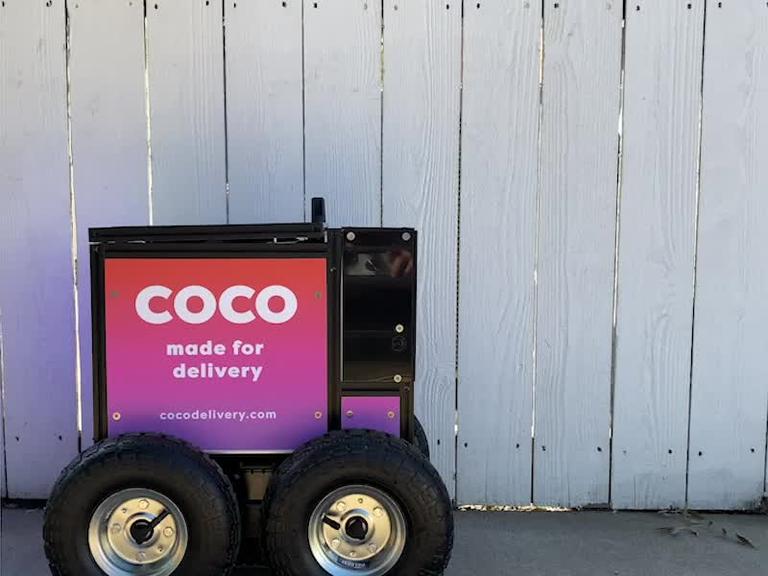The Covid-19 pandemic accelerated the adoption of restaurant and in-store retail tech, as quarantined and locked-down consumers searched for ways to get groceries and prepared meals delivered to their homes.
According to Zach Rash, co-founder and CEO at Coco, many of the existing delivery options fall short.
“These delivery services have a fundamental flaw. A lot of restaurants don’t actually make any money on them because of how much the fees cost,” he says, referring to on-demand delivery apps that aggregate orders and hand them over to subcontracting drivers on mopeds, bicycles, or in cars.
“You get a lot of couriers double-parking in front of your restaurant, waiting in your line, or taking up space in the store. That hurts the experience for dine-in guests.”
Restaurant staff also usually have to fetch orders for couriers, taking their attention away from in-store operations and keeping on-premise guests happy.
So: how’s about we get robots to do it?
For the most part, robot delivery has remained a futuristic concept, stuck in ideation. Most media reports frame autonomous delivery as a test run or pilot, Rash says. This sentiment colored many of his company’s initial interactions with potential restaurant partners.
“We were met with that at first, but once we started working with some of these bigger trusted brands and showing the results, it actually spreads pretty fast because merchants talk [and] see their neighbor signing up for this and they see more robots in their neighborhood doing deliveries,” he says.
To entice skeptical vendors, Coco offers a free week-long test run so they can see how it works, whether it impacts their operations negatively, and how the economics pan out.
Investors seem to like that approach. The Los Angeles-based startup recently raised $36 million in a Series A round led by Sam Altman, Silicon Valley Bank, and Founders Fund.
Santa Monica-based Coco, which started as a UCLA spin-out named Cyan Robotics, distinguishes itself from other robo-delivery startups by relying on remote drivers instead of automation to pilot its robots through the streets.
Restaurant staff prepare food and place it inside a robot located at their store. The robot then locks the compartment where the food is contained and heads towards the delivery destination. The orderer receives a text message with a code to unlock the robot.
Coco has optimized its platform so that its robots take routes that are less pedestrian-dense. This cuts down on potential tampering, delays, and other issues.
According to Coco, its robots have shaved 30% off of delivery time for its restaurant clients – while getting orders to customers on-time 97% of the time.
“We can save them 50% or more on the actual delivery cost because we’re just plugging into the customers they already own,” Rash adds.
Merchants are charged on a per-delivery basis that varies according to how far the robot travels. Coco can also work with third-party services like DoorDash and Uber Eats that secure the initial order, while its robots handle delivery.
Coco will use the new funding to grow its team of 120 employees to over 1,000 by the end of the year. It will also acquire more hardware and expand into new markets, growing from over 50 current merchant partners – which include California’s Umami Burger.
Scaling up won’t be without its challenges, with an increasing number of players entering the space. Even ‘big tech’ is throwing its hat in the ring; Uber spun out a delivery robot startup called Serve Robotics earlier this year, while Google parent Alphabet’s drone delivery service recently hit a 100,000-delivery milestone in Australia.
Many merchants are starting to feel overwhelmed by the number of options and the pressure to keep pace, by Rash’s observation.
“There are so many products being pitched to them all day, every day. We are really trying to simplify and streamline things for merchants and work with them on what they actually need,” he says.
“We try to hide a lot of that complexity and just say, ‘OK, Coco is your trusted partner, all you need to worry about is managing Coco and we’ll take care of the rest.'”





